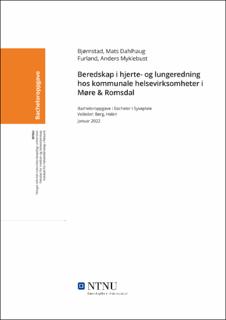| dc.contributor.advisor | Berg, Helen | |
| dc.contributor.author | Bjørnstad, Mats Dahlhaug | |
| dc.contributor.author | Furland, Anders Myklebust | |
| dc.date.accessioned | 2022-07-12T17:21:37Z | |
| dc.date.available | 2022-07-12T17:21:37Z | |
| dc.date.issued | 2022 | |
| dc.identifier | no.ntnu:inspera:112530456:113451067 | |
| dc.identifier.uri | https://hdl.handle.net/11250/3004897 | |
| dc.description.abstract | Hensikt: Målet med denne studien var å kartlegge kommunehelsetjenestens HLR-beredskap i Møre og Romsdal, i form av virksomhetenes rutiner for HLR og helsepersonells opplevde kompetanse på HLR. Metode: 454 helsepersonell fra 25 kommuner i Møre og Romsdal besvarte en kvantitativ spørreundersøkelse angående trening og opplevd kompetanse i HLR. Svarene ble sortert og deskriptivt analysert med korrelasjon og bivariat. Resultat: Flesteparten av deltakerne føler seg trygge på gjennomføring av HLR, men er misfornøyde med treningen på arbeidsplassen. Faste rutiner i kursing av HLR har en positiv sammenheng med flere andre faktorer som ble undersøkt i spørreundersøkelsen. Diskusjon: Helsepersonell bedømmer sine ferdigheter i HLR som gode. Forskning sier derimot at mer hyppig trening er nødvendig for å kunne utføre HLR med god nok kvalitet av standard, satt av internasjonale organisasjoner. Implementering av faste rutiner for trening i HLR på arbeidsplass, ser ut til å være en avgjørende faktor for å bedre beredskapen i kommunene. | |
| dc.description.abstract | Aim: The aim of this study was to identify the municipal healthcare service’s CPR preparedness by investigating the healthcare service providers routines for CPR training and how the healthcare workers experienced their own CPR competence. Method: 454 healthcare workers from 25 municipalities in Møre og Romsdal county answered a questionnaire about training and self-assessed skill in CPR. The answers were sorted and descriptively analyzed with correlation and bivariate. Results: Most of the participants assessed their own CPR skills as good, but the majority of participants were dissatisfied with the frequency of CPR training at their workplace. There was a positive correlation between workplaces with routines for CPR training and several other factors that we asked about in the questionnaire. Conclusion: The questioned healthcare workers assess their own CPR skills as good. However, previous research suggests that more frequent training is needed to be able to give CPR that meets the quality standards set by international organizations. Implementation of routines for training CPR at the workplace seems to be a factor that will improve the CPR preparedness of the municipalities. | |
| dc.language | nob | |
| dc.publisher | NTNU | |
| dc.title | Beredskap i hjerte- og lungeredning hos kommunale helsevirksomheter i Møre & Romsdal | |
| dc.type | Bachelor thesis | |
